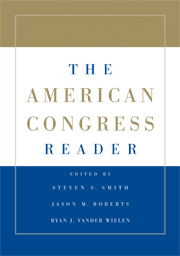Book contents
- Frontmatter
- Contents
- THE AMERICAN CONGRESS READER
- PART I THE AMERICAN CONGRESS: MODERN TRENDS
- PART II REPRESENTATION AND LAWMAKING IN CONGRESS: THE CONSTITUTIONAL AND HISTORICAL CONTEXT
- PART III CONGRESSIONAL ELECTIONS AND POLICY ALIGNMENTS
- PART IV MEMBERS, GOALS, RESOURCES, AND STRATEGIES
- PART V PARTIES AND LEADERS
- PART VI THE STANDING COMMITTEES
- PART VII THE RULES OF THE LEGISLATIVE GAME
- PART VIII THE FLOOR AND VOTING
- PART IX CONGRESS AND THE PRESIDENT
- PART X CONGRESS AND THE COURTS
- PART XI CONGRESS, LOBBYISTS, AND INTEREST GROUPS
- 36 Buying Time
- 37 “Legislative Lobbying” – Excerpt
- PART XII CONGRESS AND BUDGET POLITICS
- PART XIII FURTHER READINGS ON CONGRESSIONAL POLITICS
- References
36 - Buying Time
Moneyed Interests and the Mobilization of Bias in Congressional Committees
Published online by Cambridge University Press: 05 June 2012
- Frontmatter
- Contents
- THE AMERICAN CONGRESS READER
- PART I THE AMERICAN CONGRESS: MODERN TRENDS
- PART II REPRESENTATION AND LAWMAKING IN CONGRESS: THE CONSTITUTIONAL AND HISTORICAL CONTEXT
- PART III CONGRESSIONAL ELECTIONS AND POLICY ALIGNMENTS
- PART IV MEMBERS, GOALS, RESOURCES, AND STRATEGIES
- PART V PARTIES AND LEADERS
- PART VI THE STANDING COMMITTEES
- PART VII THE RULES OF THE LEGISLATIVE GAME
- PART VIII THE FLOOR AND VOTING
- PART IX CONGRESS AND THE PRESIDENT
- PART X CONGRESS AND THE COURTS
- PART XI CONGRESS, LOBBYISTS, AND INTEREST GROUPS
- 36 Buying Time
- 37 “Legislative Lobbying” – Excerpt
- PART XII CONGRESS AND BUDGET POLITICS
- PART XIII FURTHER READINGS ON CONGRESSIONAL POLITICS
- References
Summary
Hall and Wayman examine the effects of campaign contributions on legislative behavior. Unlike previous literature, which primarily concentrated on voting behavior, the authors examine the relationship between moneyed interests and members' legislative participation. They find that group expenditures are more likely to have an effect in committee than on the floor, and contributions significantly encourage legislative involvement.
At least since Madison railed about the mischiefs of faction, critics of U.S. political institutions have worried about the influence of organized interests in national policymaking. In this century, one of the most eloquent critics of the interest group system was E. E. Schattschneider, who warned of the inequalities between private, organized, and upper-class groups on the one hand and public, unorganized, and lower-class groups on the other. The pressure system, he argued, “mobilized bias” in national policy-making in favor of the former, against the interests of the latter, and hence against the interests of U.S. democracy. Such concerns have hardly abated thirty years since the publication of Schattschneider's essay. In particular, the precipitous growth in the number and financial strength of political action committees has refueled the charge that moneyed interests dominate the policy making process.
Despite the claims of the institutional critics and the growing public concern over PACs during the last decade, the scientific evidence that political money matters in legislative decision making is surprisingly weak.
- Type
- Chapter
- Information
- The American Congress Reader , pp. 401 - 413Publisher: Cambridge University PressPrint publication year: 2008



